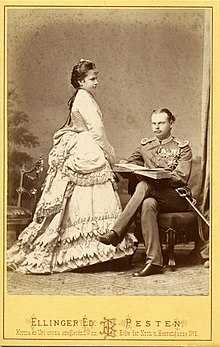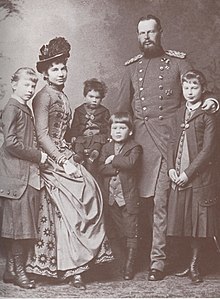
This article was written by Franziska.
Early childhood
Gisela Louise Marie, Archduchess of Austria, was born on 12 July 1856.

She was the second daughter of Emperor Franz Joseph I of Austria and his wife, the famous Empress Elisabeth. Although her christening name was Gisella, she wrote her own name with only one l.
Her mother Elisabeth was only 18 years old when she gave birth to Gisela and only one year had passed since she had given birth to Gisela’s older sister Sophie Friederike. When the Emperor and Empress took their children with them on a trip to Hungary, both children became seriously ill; Sophie Friederike died from typhoid fever, while the ten-month-old Gisela survived.
The Empress blamed herself for the death of her child, as she had taken the children with her against the advice of her mother-in-law, Archduchess Sophie. After returning to Vienna, she left Gisela in the hands of the Archduchess. From that point on she paid little attention to her now oldest daughter and focused on her own beauty and health, as well as politics.
Gisela grew up in her grandmother’s household together with her younger brother, Rudolf. The children were very close and when it was time for Rudolf to receive his own household and new teachers the children were heartbroken. It is unknown what Gisela thought about the strict and harsh treatment Rudolf had to endure, but it is safe to say that she was relieved when her mother stepped between teacher and son, probably saving his life. This was, however, the only time Elisabeth fought for the rights of her older children.
Education
Archduchess Sophie took care of Gisela’s education. She was an excellent equestrienne and hunter and thereby followed the traditions and values of her family. Gisela learned the languages of the empire her father ruled and was instructed in domestic duties.
Marriage

Although Empress Elisabeth had always regretted her early marriage she arranged a marriage for Gisela as the girl reached the age of 16. On 20 April 1873, she married Leopold, Prince of Bavaria, who was also her second cousin. Their marriage turned out to be a happy one as Leopold’s family welcomed Gisela warmly. With them, she experienced a fully functioning family life for the first time. Her father, Emperor Franz Joseph I, often came to visit. Her mother, however, did not actively stay in touch with Gisela. She attended the christening of her first child, but stayed away from Gisela and her family for most of the time. Elisabeth did not even attend Gisela’s wedding.
Gisela and Leopold had four children, whom she loved deeply: Auguste, Elisabeth, Konrad, and Georg.
Leopold died on 28 September 1930 and about two years later, on 27 July 1932, Gisela followed her husband. She was buried next to Leopold at the St. Michael church in Munich. She was 76.
Social commitment
Gisela dedicated a huge part of her life to the church, to the disadvantaged and the poor. During World War I, she set up a military hospital in her home. After fleeing from Munich to Ischl in 1918 Leopold and Gisela struggled to settle in as normal citizens. The council of workers and soldiers, responsible for the distribution of food, called them ‘royal parasites’ and refused to include them. But the people remembered Gisela’s social commitment and what she had done for them and did their best to help them. Thanks to them Gisela and Leopold were able to live peacefully as regular citizens.
Relationships and Personality

Gisela was said to be quiet, calm, and peaceful – very much like her father, whose company she enjoyed. She always obeyed her grandmother and worked hard for a harmonious family life: Archduchess Sophie raised Gisela to be the perfect wife and mother, which later showed in the happy marriage Gisela had with Leopold. Her Bavarian grandmother, Ludovika, enjoyed Gisela’s attention and care in later life.
Gisela was very close to her younger brother Rudolf, who she loved deeply. Even after her marriage and move to Bavaria, they stayed in touch, and she was well-informed of his life. She knew how unhappy he was in his marriage to Stephanie of Belgium and how he suffered from health problems. She also tried to convince her father to treat Rudolf more like a son and less like an heir, but failed.
Although Marie Valerie was born in 1868 and was therefore 12 years younger than Gisela, they were close in later life. Marie Valerie often visited her sister in Munich and stayed in touch with her. The diary of her younger sister mentions the shock Gisela experienced shortly after Rudolf’s suicide in January 1889. Gisela never managed to get over his death and blamed his wife Stephanie for driving him into suicide. Together with her sister, she consoled her father, while her mother never came to terms with her son’s death.
Empress Elisabeth never came to visit Gisela in her home in Munich and preferred to stay in a hotel. In her poems, she describes Gisela as a “thin swine” (German: rackerdürre Sau) and her children as “piglets” (German: Ferkelein). As Elisabeth found beautiful women and girls to be the more interesting conversational partners, she had little interest in building a close relationship to Gisela.
Gisela as a name-giver
Several places, buildings, societies, and more were named after Gisela:
- Rail line: Giselabahn (Gisela Train) as a part of the Kaiserin-Elisabeth-Bahn, named after her mother
- Street: Giselatraße in Wörgl, Austria
- Insurance: Gisela Allgemeine Lebens- und Aussteuer-Versicherungs-AG (Gisela General Life and Dowry Insurance)
- Ship: Gisela Paddlewheeler
- Gisela Square in Budapest – today Vörösmarty tér
- Schools: Gisela Gymnasium Munich

Everytime I read something that has something to do with Elisabeth I think why is the world still in love with a woman that did not have normal feelings and was very mentally disturbed like Empress Elisabeth.
What a terrible woman and I am so sorry for her poor children .
But that was normal in those days I guess.
The romanticised movies probably didn’t help at all!
This was so interesting. It’s sad to read how unhappy her home life is. The early marriage was a blessing in the end as she escaped and got to have a happy normal family life.
They seemed to be such a dysfunctional family. I wonder if Elisabeth had never married Joseph and married some nobleman if she would have been a better, happier person or were all her issues already there and would have come out no matter who she married. The Austrian Court seems like such a miserable place to live.
In her early poems, written when she was a young teen, she talked about the beauty of death and suicide. She probably had issues long before her wedding
It is noted that there was mental instability in the Bavarian Royal family.Could this not also have been a factor with the Empress Elisabeth? It is also noted that Empress Elisabeth was not a happy person with her marriage and the severe and strict Austrian Court ritual that was forced on her.
Do u sell copies of the books your short stories tell about these brave and unfortunate royal women? I would like to add to my collection.
I have written two biographies but the short stories themselves have not become a book yet, but it could be a good idea! 😉
yes please 🙂
How strange that Gisela should not have been considered attractive-I think she is quite pretty, much more so than Marie Valerie.